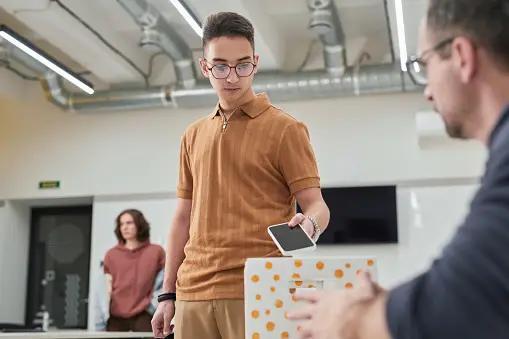Mobile phones have become an essential part of our lives. We use them to stay connected with friends and family and stay up-to-date on the news. But what about in schools? Can schools take your phone or confiscate items from students?
A school can take your phone or other property depending on the state laws and policies. In general, schools have the right to confiscate student property if it is disruptive or violates school rules.
However, they cannot take your property without a valid reason and search it without your permission.
In this article, we will discuss what items schools can confiscate if they are considered to be a disruption to learning.
Table of contents
Can schools take your phone for no reason?
No, schools cannot take your phone for no reason. They must have a valid reason, such as if you are using it to disrupt class or if you are violating school policy.
For example, if your school has a policy against using phones during class, then the school can confiscate your phone if you are caught using it during class.
Whether a school can take your phone or confiscate items from students depends on several factors, including the school’s policies, the laws of the state, and the circumstances surrounding the confiscation.
The laws of each state may also have specific provisions governing school searches. For example, some states require schools to obtain a warrant before searching a student’s phone.
Related Post: Top 10 Grammar Schools in the UK | Full Review
Can schools take your property?
Yes, schools can take your property if it is disruptive or violates school rules. However, they cannot take your property without a valid reason and they cannot search it without your permission.
For example, if you bring a knife to school, the school can confiscate it because it is a dangerous weapon.
In general, schools have the authority to establish and enforce rules and regulations for student conduct, including rules about the use of cell phones and other electronic devices.
Schools can confiscate student property, such as phones, if the student violates a school rule.
However, schools cannot violate students’ constitutional rights. The Fourth Amendment to the U.S. Constitution protects individuals from unreasonable searches and seizures.
This means that schools cannot search a student’s phone without probable cause to believe that the phone contains evidence of a crime.
Are teachers allowed to take your phone?
Yes, teachers are allowed to take your phone if they have a valid reason and if it is school policy. However, they cannot search your phone without your permission. If you refuse to give them your phone, they can call the principal or the school resource officer.
Related Post: How To Find The Best A-level Maths Online Tutors In 2024
How long can a school confiscate your phone or an item?
The length of time that a school can confiscate your phone or other property varies from school to school. Some schools have a policy of returning the property at the end of the school day, while others may keep it for a longer period.
If you are unsure how long your school will keep your property, you should ask your teacher or principal.
Here are some additional things to keep in mind about schools confiscating student property:
- The school must have a written policy that outlines the reasons why they can confiscate property and how long they can keep it.
- The school must notify you in writing if they confiscate your property.
- You have the right to appeal the confiscation of your property.
- If the school violates your rights, you may be able to file a lawsuit.
If you believe that your school has violated your rights by confiscating your phone or other property, you should talk to your parents or guardians. They may be able to help you file a complaint with the school or with the school district. You can also contact the ACLU or another civil rights organization for help.
Here are some tips for avoiding having your phone or other property confiscated by the school:
- Follow the school’s policy on cell phone usage.
- Don’t use your phone to disrupt class or to violate school rules.
- Keep your phone in your backpack or pocket when you’re not using it.
- If you’re caught using your phone in class, be polite and cooperate with the teacher.
What are the negative effects of mobile phones on students?
There are a number of negative effects that mobile phones can have on students. These include:
- Distraction: Mobile phones can be a major distraction in the classroom. Students who are constantly checking their phones are less likely to pay attention to the lesson.
- Cyberbullying: Mobile phones can be used to bully other students. This can be done through text messages, social media posts, or even pictures or videos.
- Addiction: Mobile phones can be addictive. Students who spend too much time on their phones may find it difficult to focus on their schoolwork or other activities.
- Sleep deprivation: The blue light emitted from screens can interfere with sleep. Students who use their phones in bed may find it difficult to fall asleep or stay asleep.
Related Post: 10 Effective Brain Foods for Studying During Exam Season in 2024
What age should a kid get a phone?
There is no one-size-fits-all answer to this question. The age at which a child should get a phone depends on a number of factors, such as the child’s maturity level, their need for a phone, and the family’s rules about phone use.
Some experts recommend that children wait until they are at least 12 years old before getting a phone. This is because children at this age are generally more mature and responsible. They are also less likely to be addicted to their phones or to use them for cyberbullying.
However, there are also some cases where it may be appropriate for a child to get a phone at a younger age. For example, if a child needs a phone for safety reasons, such as if they are walking home from school alone, then it may be necessary to give them a phone at a younger age.
Ultimately, the decision of when to give a child a phone is a personal one. Parents should weigh the pros and cons of phone ownership and decide what is best for their child.
What are schools’ confiscation laws in the UK?
The Education Act 1996 gives schools the right to search pupils and confiscate any items that are considered to be a threat to safety or a disruption to learning. This includes mobile phones, laptops, gaming devices, and other electronic devices.
Schools must have a clear confiscation policy that is in line with the law. The policy should state which items are prohibited and how they will be confiscated and returned.
Schools should also follow the following guidelines when confiscating items:
- The search should be carried out by a member of staff who is the same sex as the pupil.
- The pupil should be given a reasonable explanation for the search.
- The pupil should be allowed to keep any personal items, such as money or medication.
- The item should be confiscated respectfully.
Related Post: What Are The Average Class Size of Secondary Schools in the UK?
How to get a confiscated phone back from school
If the school has confiscated your phone, you will need to follow the school’s procedures for getting it back. This may involve writing a letter to the headteacher or attending a meeting with the school’s discipline committee.
In some cases, you may be able to get your phone back immediately. However, in other cases, you may have to wait until the end of the school term.
If you are not satisfied with the school’s decision, you can appeal to the local authority.
Here are some additional tips for dealing with a confiscated phone:
- Be respectful and cooperative with the school staff.
- Explain why you need your phone back and what you will do to ensure that it is not a distraction in the classroom.
- Be prepared to compromise. The school may be willing to return your phone if you agree to certain conditions, such as not using it in class or only using it during breaks.
Can a school take your phone if you are 18?
Yes. The age of majority is 18 in most states, but this does not mean that students over the age of 18 are immune from school discipline. Schools can still confiscate property from students over the age of 18 if the student violates a school rule.
However, there are some exceptions. For example, in some states, students over the age of 18 have a right to privacy in their belongings, including their phones. This means that schools may need a warrant to search the phone of a student over the age of 18.
Related Post: How to Become a Student Writer in a Short Time
Can schools search through your phone?
Schools cannot search a student’s phone without probable cause to believe that the school phone contains evidence of a crime. However, there are some exceptions.
For example, schools may be able to search a student’s phone if the student consents to the search or if the search is necessary to protect the safety of students or staff.
Is it legal for a school to take your phone overnight?
In general, yes. Schools can confiscate student property for a reasonable period, such as overnight. However, schools cannot keep a student’s property for an unreasonable period, such as for weeks or months.
Is it illegal for a school to take your phone for a week?
In general, yes. Schools cannot keep a student’s property for an unreasonable period, such as for weeks or months. However, there may be some exceptions.
For example, if a student is caught cheating on a test using their phone, the school may be able to keep the phone for a week as punishment.
Related Post: Is a Nursing Degree Hard? | 2024 Expert Tips
Conclusion
Schools have the right to confiscate items that are prohibited or that are considered to be a disruption to learning. However, they must follow the law and their policies when doing so.
If your phone has been confiscated by the school, you should follow the school’s procedures for getting it back.
FAQs
If your school takes your phone, you should first try to talk to the school administrator who took your phone.
The consequences of violating a school’s phone policy vary from school to school. Some schools may simply confiscate the phone for a period of time, while others may suspend or expel the student.
There are several benefits to schools having a phone policy. First, it can help to reduce distractions in the classroom. Second, it can help to prevent students from using their phones to cheat or bully other students. Third, it can help to protect students from cyberbullying and other online dangers.
The decision of whether or not to have a phone policy is up to each school. However, schools need to weigh the benefits and drawbacks of such a policy before making a decision
References
- thinkstudent.co.uk – Can schools confiscate items from students
- lovetoknow.com – Is it legal for schools to confiscate cell phones
- schoolsweek.co.uk – What’s the law on confiscating a pupil’s mobile phone





